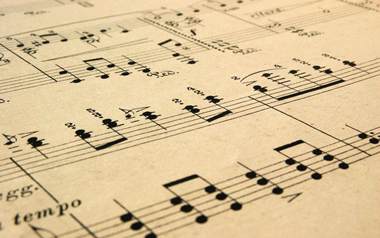How to Find Vocal Sheet Music for Auditions
If you're auditioning for a musical, you've got to have the vocal sheet music to your songs. Why? Because if you don't, then you must sing a cappella. And most (if not all) casting directors think that's unprofessional.
Luckily, every musical theatre audition you attend will have an accompanist: a piano player who can sight read sheet music. So your job is to find the sheet music to your songs, format it, and present it to your accompanist.
Finding Sheet Music
The first thing to do is ask around. 55% of what you're looking for can be obtained from a friend of a friend.
How about the other 45%? Do a search at Sheet Music Plus, they have some of the obscure stuff you won't find elsewhere.

And our secret weapon is the Drama Bookshop in New York City. Those folks have been in business since 1917, right in midtown Manhattan. Your best bet? Call them up and ask. If they don't have it, they can get it. Anything you want! (And their shipping is really cheap.)
Piano and vocal sheet music is surprisingly easy to find, but a word of caution: Stay away from hand-written sheet music. It's hard for musicians to read.
Cutting Your Sheet Music
Your typical musical audition notice goes like this...
Please prepare a brief musical theatre song in your key.
or else it's...
Bring in your best sixteen bar ballad.
Notice the key words: brief and sixteen bar. They want you to show off your singing chops in 45 seconds or less. How?
Every song has a climax, or the most intense part, usually near the end. Your job is to find it in your sheet music. Then find sixteen measures leading up to it. That's called your sixteen bar.
Ideally, every song in your book should have three versions:
• The sixteen bar version
• The thirty-two bar version
• The whole song
Why? Because at some auditions you only get 2 minutes, and sometimes you get 5 minutes. You never know.
It doesn't have to be exactly sixteen measures long. You can be flexible. The trick is to get it to flow naturally, almost like a miniature song. As with most things, the more you practice, the better you get.
If you found your sheet music in a songbook, do not bring the songbook into an audition. Your accompanist will hate you. He'll spend the whole time trying to keep the book from falling over, and ruin your audition.
Instead, photocopy the music. Then, splice your sixteen bars together with scissors and scotch tape. Then copy the whole thing again. Voila!
Your Songbook
Your audition songs should be neatly organized into a three-ring binder.
The pages should be taped together, back to back. This will reduce page turning for your accompanist.
If you have doubts about your songbook structure, here's the rule of thumb: Make it easy for your accompanist. Some ideas:
-
• Use only white paper.
-
• Enlarge the print when photo-copying.
-
• Use a yellow highlighter for tempo and dynamic markings.
-
• Fold up the bottom corner of the page for a quicker page turn.
The easier to read, the better they play. The better they play, the better your audition will be.
The Bottom Line
Your vocal sheet music is yet another tool in your audition arsenal, designed to leave the best impression on the casting director. It's just as important as your headshot, resumé, and demo reel. Spend some time to make it perfect, and you could be starring in a musical!